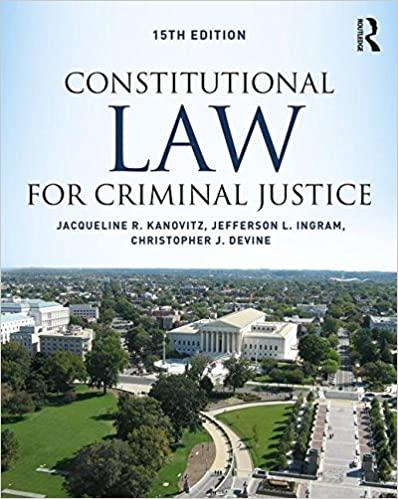Question
The rulings and opinions of the EU Court of Justice are merely advisory, and are not binding on the member nations of the EU. a.
The rulings and opinions of the EU Court of Justice are merely advisory, and are not binding on the member nations of the EU.
a. True
b. False
2.Timberlane Lumber Co. v. Bank of Americaaddressed the extraterritorial application of U.S. intellectual property laws.
a. True
b. False
3. Private persons have standing to sue in cases brought before the International Court of Justice.
a. True
b. False
4. Yerba AG conducts business throughout the world. Yerba's principal place of business is in Leverkusen, Germany. Although Yerba does business in the United States, Yerba it is still subject to the Foreign Corrupt Practices Act.
a. True
b. False
5. Beth, a U.S. citizen, works in Mexico for Unipair, a U.S. company. Because Beth works in Mexico, she is not protected by the U.S. civil rights laws from employment discrimination.
a. True
b. False
6. The World Trade Organization is simply an extension of GATT.
a. True
b. False
7. Arbitration agreements in international contracts are disfavored.
a. True
b. False
8. Nationalization is a government act that takes private property and converts it into government owned property.
a. True
b. False
9. A nation is immune from lawsuits as a result of its actions unless it agrees to give up or limit its sovereign immunity.
a. True
b. False
10. UNCITRAL is a UN agency designed to foster international trade.
a. True
b. False
11. Which statement best describes the extraterritorial application of U.S. antitrust laws?
a. U.S. antitrust laws do not have extraterritorial application.
b. U.S. antitrust laws have extraterritorial application if the alleged restraint of trade affects, or was intended to affect, the foreign commerce of the United States.
c. U.S. antitrust laws have extraterritorial application if the defendant has its principal offices in the United States.
d. U.S. antitrust laws have extraterritorial application if there is a global trade agreement in place.
12. Troblic, Inc., a U.S. business, has decided to expand into Mexico. In entering the Mexican market, Troblic:
a. does not need to be concerned about cultural differences between the U.S. and Mexico because of the North American Free Trade Agreement (NAFTA).
b. does not need to be concerned about cultural differences between the U.S. and Mexico because Mexico is part of North America.
c. does not need to be concerned about cultural differences between the U.S. and Mexico because both countries follow the universal guidelines.
d. must be concerned about cultural differences between the U.S. and Mexico.
13. TheFrigaliment Importing Co. v. B.N.S. Int'l Sales Corp.case demonstrates:
a. the proper use of letters of credit.
b. the limitations of the North American Free Trade Agreement.
c. the international application of U.S. antitrust laws.
d. the difficulty of language usage in international contracts.
14. Nathaniel LTD has its principal office in Toronto, Canada. Nathaniel conducts business worldwide, but the majority of its business is with the United States. Which statement is correct?
a. Nathaniel must abide by the Foreign Corrupt Practices Act (FCPA) because the FCPA applies extraterritorially.
b. Nathaniel must abide by the Foreign Corrupt Practices Act only when it does business in the United States.
c. Nathaniel does not have to abide by the Foreign Corrupt Practices Act because its principal office is in Canada.
d. Nathaniel does not have to abide by the Foreign Corrupt Practices Act if it secures positive clearance under the North American Free Trade Agreement (NAFTA).
15. Conrad, a U.S. citizen, works in Argentina for Uniforce, a U.S. company. Which statement is correct?
a. Conrad is protected by the U.S. civil rights laws from employment discrimination because he is a U.S. citizen and works for a U.S. company.
b. Conrad is protected by the U.S. civil rights laws from employment discrimination because of the Western Hemisphere Free Trade Agreement.
c. Conrad is not protected by the U.S. civil rights laws from employment discrimination because he is working in Argentina.
d. Conrad is not protected by the U.S. civil rights laws because of the long-standing principle that American law only applies within the territorial jurisdiction of the United States.
Step by Step Solution
There are 3 Steps involved in it
Step: 1

Get Instant Access to Expert-Tailored Solutions
See step-by-step solutions with expert insights and AI powered tools for academic success
Step: 2

Step: 3

Ace Your Homework with AI
Get the answers you need in no time with our AI-driven, step-by-step assistance
Get Started


